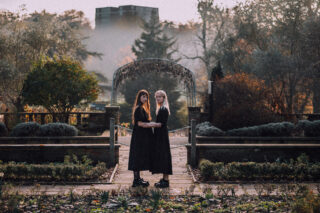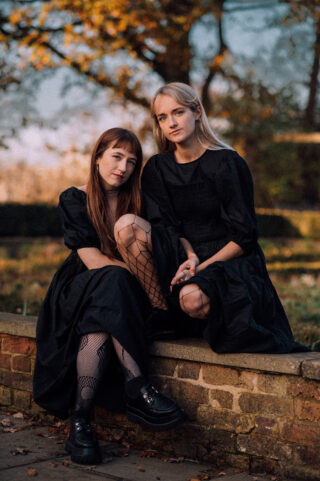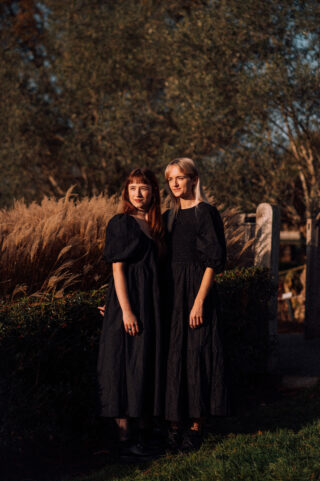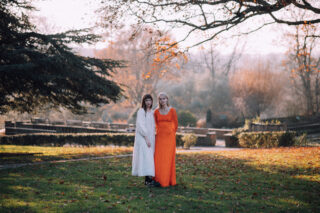Folk duo Lilo: “We saw this competition for studio time at Abbey Road, and we wrote the world’s worst song”
How childhood friends Christie Gardner and Helen Dixon went from Pop Party 5 to timeless Americana

How childhood friends Christie Gardner and Helen Dixon went from Pop Party 5 to timeless Americana
Sometimes the genesis of great music, and musicians by extension, comes with an early childhood pipedream. It has to be coupled with determination and the hard work that major players will always tell you is integral to success – raw talent alone isn’t enough – but sometimes, it’s something that slowly unfurls through a particular combination: growing passions, timing, friendships that are built on their shared interest and surprising realisation that you’re good at actually making music.
For Lilo, the folk duo comprising Winchester natives Christie Gardner and Helen Dixon, the friendship came first.
“Within our friendship group we weren’t best friends but we became that around about when the band formed. I don’t think that was a coincidence,” says Helen. Their passion for music grew separately but in tandem, eventually uniting them. “I’d grown up listening to Pop Party 5,” continues Helen, referring to those classic pop mistakes from the ’00s, but it was when a friend’s mum made them a mix for End of The Road (their first gig outing as a group of friends) that opened them up to a new world. “I had no idea this all existed… people like Doug Paisley, Dan Mangan, Jeffrey Lewis and Mountain Man.” A festival committed to uplifting emerging talents, it was the perfect place for discovery and altered their perception of what music meant, forming the foundation of their personal tastes. Around this time, artists like Laura Marling were reaching prominence, and Helen and Christie also gained an affinity for anti-folk and contemporary Americana. As a result, in the belly of their teens they thought they’d give the music thing a go.


“We saw this competition in Johnnie B magazine for studio time at Abbey Road,” says Christie, “and [to enter] we wrote the world’s worst song.” She laughs, but that was the point, around age 14, that she and Helen started to take the band seriously.
Their music is a mix of the past and the present. Instinctually they’ll be labelled indie-folk, and that’s accurate (‘Beach (Real Love)’, for example, blends the suspense of Big Thief with the sensitivity of First Aid Kit) but what sets them apart from their contemporaries is a real understanding of Americana-influenced folk’s lineage as a genre. Think Emmylou Harris’ soul bearing and the pitch-perfect vocal glide of Karen Carpenter.
The influence of Winchester is also present. “It’s tranquil, there’s a lot of nature – it’s the countryside and there are lots of hills,” says Christie. Their music almost provides a soundtrack to this landscape, calmness imbued in every sound and strum, and the status of Winchester as a notably old city, with inhabitation dating all the way back to prehistoric times, might have unconsciously had an influence on the agelessness of their sound. “Our music is definitely born from the present,” says Christie, “but it feels timeless and as though it goes back to the past – maybe primordial.”
Owing to their long-standing friendship, their creative process is built on implicit trust. Relationships, whether romantic or platonic, form the central themes of their songs, whether it’s tracks about the very friendship group from which their own relationship developed, or the more complicated ones that come about with age: “One song is about when a friend starts to date someone you just don’t like, but realising it isn’t your life or relationship – it’s about being there to catch them if they fall,” says Helen.
Unlike many duos and bands who treat their process like a communal brainstorming session for as long as studio time allows, Lilo mostly write separately. For Christie, instincts lead her writing, allowing her to free up both imagination and time. “Christie’s writing process is unlike anyone I’ve ever met – it’s chaotic!” Helen says with applause. “I labour over things for ages, but Christie can sit down for a little bit and come out with a fully-formed song… It’s so rare to find someone like that.”

For Helen, the process is longer, a pattern of sticking ideas to the wall and waiting for the song to come to you. Christie equally admires this. “If you look at her notebook it’s pages and pages and pages of prose, which you then chip away at – like Michaelengelo chipping away at a sculpture – until you get something amazing. I’ve also never seen that before.” Though Helen’s process may take longer, it helps to unfurl feelings that weren’t immediately present. “I’ve had times where I’ve sat to write something and as we go through the process of putting the song together I’ve realised it’s not actually what I meant to say. It helps me unpack things.” As a listener you wouldn’t be able to tell that their processes are so independent of one another. It sounds totally seamless.
Another piece of connective tissue for their music is their broader understanding about what it means to be artists. They left leafy Winchester for London to study arts subjects at university: History of Art, and French and Philosophy. It’s not these subjects directly informing their music (a university education isn’t a prerequisite for making great music) but it does give them a different kind of insight. Example: for Helen, who studied French and Philosophy, the overlap between art and music is instinctive, as opposed to an intellectual endeavour. “The feeling of consuming something that you think is amazing across all genres of music is an instinctive response and how you receive it is personal,” she says. “I like what Leonard Cohen once said in an interview: ‘What makes a good song? I don’t know, and if I did know I’d write loads of them!’ Or something like that [laughs]. If you could engineer a response then you would, but you can’t. I do like that sometimes I don’t know why I like the things I do.”
But this offers up other complications. Some art is produced and engineered. “I don’t have a conclusion on if this is good or bad, but I think it’s interesting that if you compare the popularity of the Mona Lisa with popular music, the ability that we have to reproduce them has changed what they mean symbolically,” says Christie. Essentially, some people want to reproduce the popularity of the art rather than the art itself. “I guess it’s how people compare pop music – music produced for mass interest – to independent or alternative music for people with niche interests,” she adds, the latter being viewed as more ‘authentic’.
Lilo see themselves as producing the latter; perhaps associated with this is a more acute fear of how their music will be received. “I have a firm belief,” Christie says, “that anyone can write a song, but the toughest thing about it is sharing it.” Perhaps fears like this aren’t about the quality of the music. The similarity between the “worst song in the world” they made all those years ago for the Abbey Road competition and their refined, mature music now is that what they think about those songs isn’t all that matters – it’s the pressure of what others think.
They shouldn’t have too much to worry about though. Their (excellent) music is grounded in a healthily indie ethos, handled with care and intuition. Though their feet are firmly set in the London emerging music scene, their work’s pop sensibilities gesture towards a potential for breakthrough success and mass appeal. What won’t change is their commitment to their friendship, one that emerged slowly but was cemented by their love of music. They’re determined to make the kind of authentic music that inspired them to start all this in the first place.